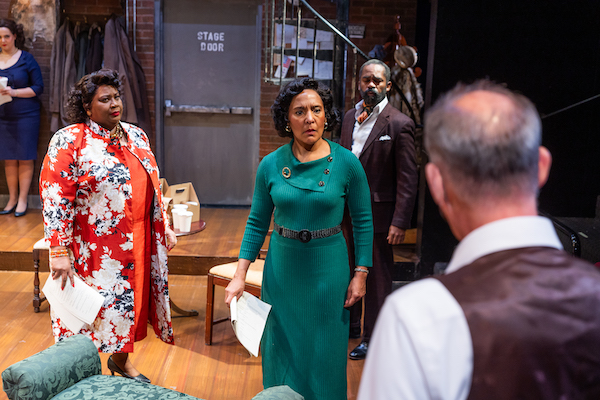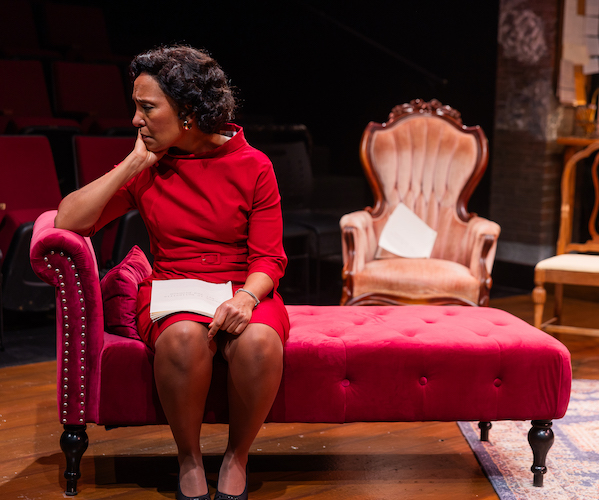Theater Review: “Trouble in Mind” — Taking a Stand Backstage
By Bill Marx
Set in New York in the mid-’50s, Trouble in Mind is a backstage dramedy that draws on the genre’s interest in the ambiguities of role-playing to condemn racial bias.
Trouble in Mind by Alice Childress. Directed by Dawn M. Simmons. Staged by the Lyric Stage at 140 Clarendon Street, 2nd Floor, Boston, through February 4.

Allison Beauregard, MaConnia Chesser, Patrice Jean-Baptiste, Davron S. Monroe, and Barlow Adamson in the Lyric Stage production of Trouble in Mind. Photo: Nile Hawver
Two plays about mendacity opened in New York City in 1955. Tennessee Williams’s Cat on a Hot Tin Roof became a Broadway hit. Black dramatist Alice Childress’s Trouble in Mind opened on Off-Broadway; there was hope for a Broadway run but it never materialized, no doubt because of the script’s still stinging attack on racial prejudice, in the theater and society at large. Williams’s Big Daddy denounced rampant materialism and self-hatred — more commercially palatable sins. Still, Trouble in Mind won an Obie, and the show turned out to be a significant harbinger of what was to come in the Off-Broadway theater movement of the early ’60s, productions that were openly hostile to conventional drama and attitudes, such as Dutchman by Amiri Baraka, then known as LeRoi Jones. Trouble in Mind doesn’t come close to Dutchman’s homicidal sexual dynamics, but uncomfortable truths are spat out in anger, particularly regarding the lies Blacks need to tell whites — and themselves — in order to survive in a hostile society. And the script, while it is definitely showing its age, has some potent points to make on that score, especially in its attack on white grievance.
Set in New York in the mid-’50s, Trouble in Mind is a backstage dramedy that draws on the genre’s interest in the ambiguities of role-playing to condemn racial bias. The play being rehearsed for a Broadway run is called “Chaos in Belleville,” an anti-lynching narrative that takes place in the postwar South. A segregationist white savior of a judge (his speech about “the way things should be” includes quotes from Hitler and Longfellow!) tries to rescue a young Black man (named Job) after he gets into serious trouble when he votes in an election. The problem with the play-within-a-play — filled with demeaning blather and inane characters — is that it is patronizing guff, its “liberal” exploitation of Black pain cartoonish. Audiences may have accepted this type of social message melodrama as entertainment six decades ago. Satirizing it now is far too easy. Crowd-pleasing caricature has become far more nuanced.
Much more timely is the power struggle between the production’s bullying white director, Al Manners (who comes from Hollywood and is staging his first Broadway play), and his cast and crew, particularly the Black performers, whom he charms, placates, and insults in a clumsily self-defeating effort to make them invest subpar material with truthfulness (or would that be truthiness?). Leading lady Wiletta has spent her career playing the craven game in a white theater world and, at first, advises others to do so. But once she is repeatedly challenged to provide the psychological “motivations” for her performance, she becomes fed up with what is a rigged, dehumanizing system. The result is a public standoff with Manners in front of a bewildered cast and crew. She accuses him of profiting from racist stereotypes, and her charges carry considerable artistic and political weight given that the director’s lame defense is that whites can stand only so much reality. Will he fire her or others from the troubled production because she dared to speak out? If only Childress’s plot had hewed a bit closer to showbiz verisimilitude. Manners’s sadistic misapplication of the Method doesn’t make much intellectual or pragmatic sense — except as a convenient way to piss everybody off.

Patrice Jean-Baptiste in the Lyric Stage production of Trouble in Mind. Photo: Nile Hawver
But these are tolerable lapses in what is a compelling and enjoyable Lyric Stage outing. Director Dawn M. Simmons has gathered a strong cast and she wisely emphases the combative rapport — comic, argumentative, conspiratorial — among the Black performers. MaConnia Chesser’s Millie Davis expertly slings sarcastic effusions, Davron S. Monroe’s Sheldon Forrester is an aptly halfhearted dispenser of ameliorative salve, and Kadahj Bennett is sturdy as John Nevins, a performer who is just starting out. Early on, Patrice Jean-Baptiste intimates Wiletta’s repressed steeliness — the character’s accumulating frustration, ending with an explosion, is nicely handled. As for the white performers, Bill Mootos serves up an appropriately weak-minded and -spirited Bill O’Wray, James Turner’s assistant is convincingly hapless, and Allison Beauregard’s ingénue hits the right innocent notes. Robert Walsh’s aging Irish stagehand ladles out the barney generously, perhaps too generously.
The major acting drawback is Barlow Adamson’s one-note Al Manners. Childress has made the director into the villain, so it would make sense for a performer to work against that, to give the character some charisma. But Adamson rarely goes beyond the strident. Director Simmons falls short when she applies too heavy a hand to staging the script’s “big” emotional set pieces — a description of a lynching and the final scene. Childress didn’t know how to end her drama; she chose to pay (sentimental) homage to Wiletta’s yearning to excel as an actress. The character could have accepted her fellow Black actors’ invitation to commiserate. As usual in American dramas, the dreams of the individual are elevated over the value of solidarity.
Speaking of the power of the group, the Lyric Stage should be congratulated for producing this trenchant work from the past. There are other postwar Black playwrights whose provocative scripts should be considered for revival as well. The work of the amazing Adrienne Kennedy, for one. (A Library of America volume of her writing has recently been released.) In 2022, at the age of 91, Kennedy finally had a play produced on Broadway. The late firebrand Ed Bullins and the acidic lampooner Ishmael Reed (who is 85) also come to mind. Trouble in Mind is about the theater daring to listen to neglected voices — there are opportunities to be seized.
Bill Marx is the editor-in-chief of the Arts Fuse. For four decades, he has written about arts and culture for print, broadcast, and online. He has regularly reviewed theater for National Public Radio Station WBUR and the Boston Globe. He created and edited WBUR Online Arts, a cultural webzine that in 2004 won an Online Journalism Award for Specialty Journalism. In 2007 he created the Arts Fuse, an online magazine dedicated to covering arts and culture in Boston and throughout New England.

I also saw this production and I congratulate Bill Marx on getting it right in his review, a measured appreciation of a flawed but meaningful play and a definitely flawed production with a handful of really splendid African-American performers. I also agree with Marx’s suggestion that Boston theater troupes do more plays by deserving Black playwrights. A much better plan than the calculated recipe followed by Diane Paulus at the A.R.T. of turning every single production into a deconstructed multicultural circus.